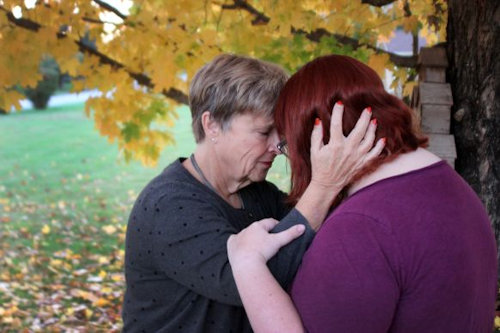SUSAN PASSI-KLAUS
United Methodist News Service
My 24-year-old daughter loves staring at the stars, growing roses (which I water) and dreaming about attending art school in England. She is crazy about dogs. Crazy about drawing. And will always remain crazy about Harry Potter.
“I can remember being wary of organized religion, even when I was quite young,” she said. “Something felt ‘off.’ When I was a bit older, I’d notice that everyone around me was clearly feeling something that I could not. They had a tangible relationship with God. They could hear his voice; they could feel his presence. I felt nothing. I thought I was broken. But I kept praying because I thought it was what I was supposed to do.
“Accepting my beliefs — or nonbelief — took me a long time because I was scared of disappointing my parents, and I was scared there was something wrong with me. I felt ashamed.”
So what are parents to do? Her dad and I debated with her. Preached to her. Reasoned with her. We used everything from theological documentation and Scriptural assurance to Sunday school lessons and counseling with the youth director — all to “prove” our point. There is never a “winner.” In the end, if there is an end, we simply decided to love her and support her life journey into herself.
Fight temptation to debate and preach
Some would say we failed not only God, but also our child. The Rev. Kenda Creasy Dean, United Methodist pastor, author and professor of youth, church and culture at Princeton Theological Seminary, understands the frustrations both parents and children face when their religious worldviews do not match.
“I’ve fallen into all the traps,” Dean said. “The feeling of failure is real. So is embarrassment. So is fear and the temptation to debate and preach.”
“Bringing kids to church helps sometimes, but not always,” she said. “If I were an honest teenager, there are times I wouldn’t have wanted to be there either. And as an honest adult, there are times I’m embarrassed by the witness of our church. And there are times I’m embarrassed by my lame witness as a parent.”
Dean’s experience with research reveals that during high school, kids are most likely to mirror their parents’ faith. However, what many young people see in that mirror is that their parents “don’t give a hoot about faith.” They do not make it a priority.
“A majority of young people hold to a benign ‘whatever-ism’ when it comes to religion,’” she said. “They believe that religion helps them to be nice and helps them feel good about themselves, but that God pretty much stays out of the way.” Much has been made of the increasing numbers of young adults — about one in three — who are religiously unaffiliated.
Dan Arel, author of Parenting without God, is “one of them.” Raised in an evangelical church, heavily involved in his church growth and nurtured by a deeply religious mother and churchgoing father, Arel began to explore beyond church pews.Study after study shows Americans are not very open-minded when it comes to atheists. In fact, they “strongly distrust and fear” — even using the word “threatened” to describe nonreligious people.
‘This is your journey’
He asked many of the questions young adults are asking today: Is anybody listening? Where is the person who should be helping us? What happens when we die?
He expects his own son, now three, to have many of the same questions. Arel will give him the unconditional freedom his parents offered: to explore and find his own way to whatever he chooses to believe.
“I know far too many atheists who have been shunned by their families,” he said. “[The parents] feel shame for what their kids believe.”
Christian parents, Arel has found, seem most afraid of what their children will not have if God is absent from their life — comfort, endurance and a place in heaven.
“It’s very scary for a parent to think their child will go to hell,” the journalist has learned. “They worry people will think their child is ‘lost,’ their social status will be tarnished or others will be judgmental about what is going on in their house.”
They especially worry their children will not have a purpose in life. However, “life has the meaning you bring to it,” he said.
Dean, a Christian, and Arel an atheist, share a philosophy: It is not a parent’s job to make their children over into their own image religiously. Parents cannot teach their children what to think, just how to think.
The parent/child bond should not be broken because they have different worldviews,” said Arel.
Consider this advice if you and your child are struggling with faith and non-faith.
- Always be supportive of your teenage children, even if you do not support everything they believe or do. Unless their beliefs harm others or themselves — which calls for immediate action — do not overreact or become confrontational. Share mutual questions, experiences and points of view.
- Don’t tell adolescents their beliefs are wrong. Support their exploration without fearing or discounting their discoveries and share the ways you explore your own faith.
- Ask yourself questions. Evaluate your beliefs. What kind of role model are you?
- Forgive yourself if you find that you and your young adult children are on different pages about faith.
- Do your best as a parent and let God do the converting. Just because some young people reject God doesn’t mean God has rejected them.
Last Updated on November 2, 2015

